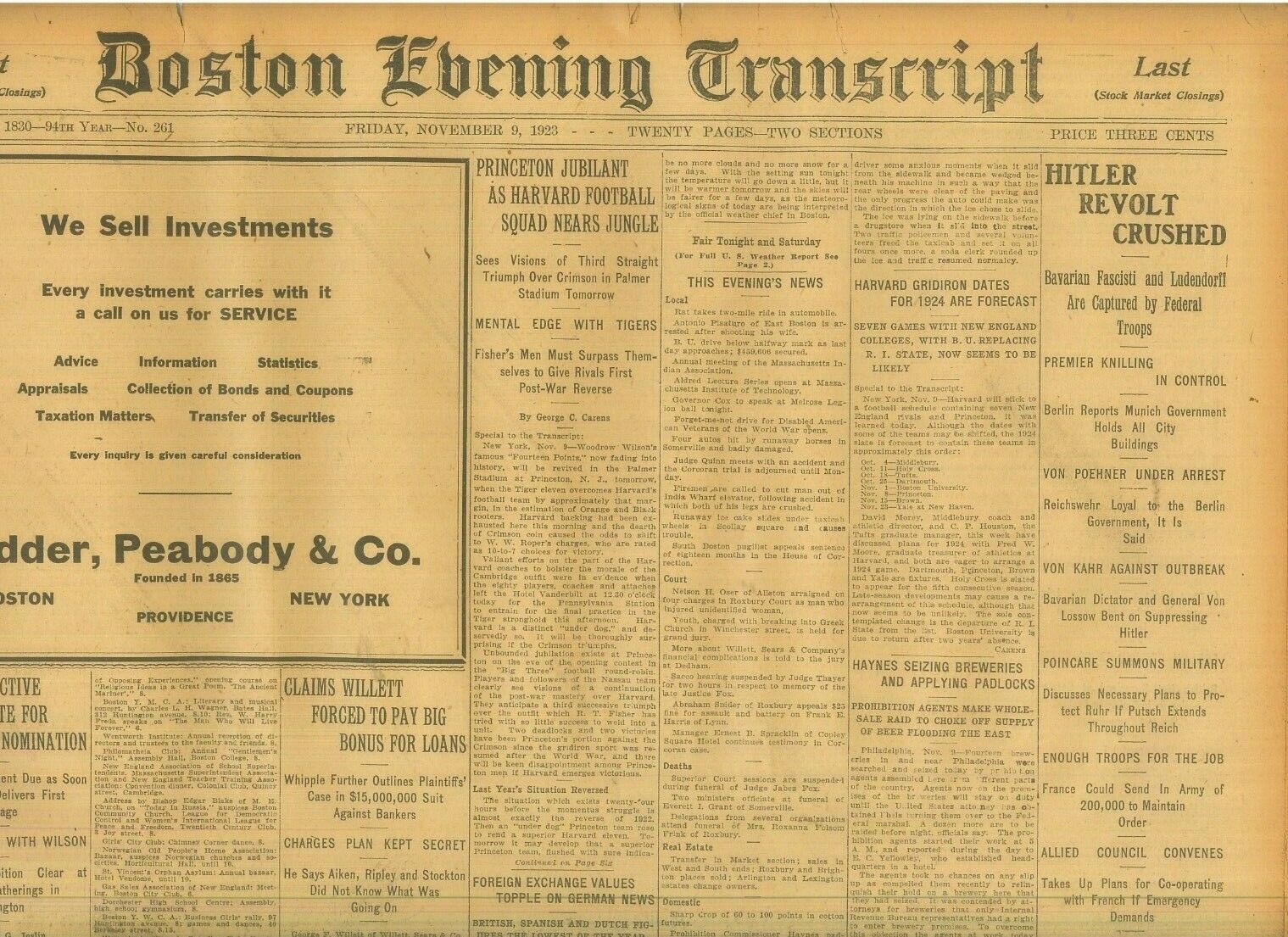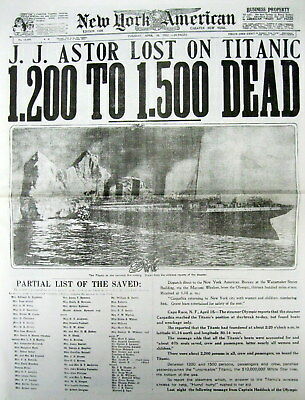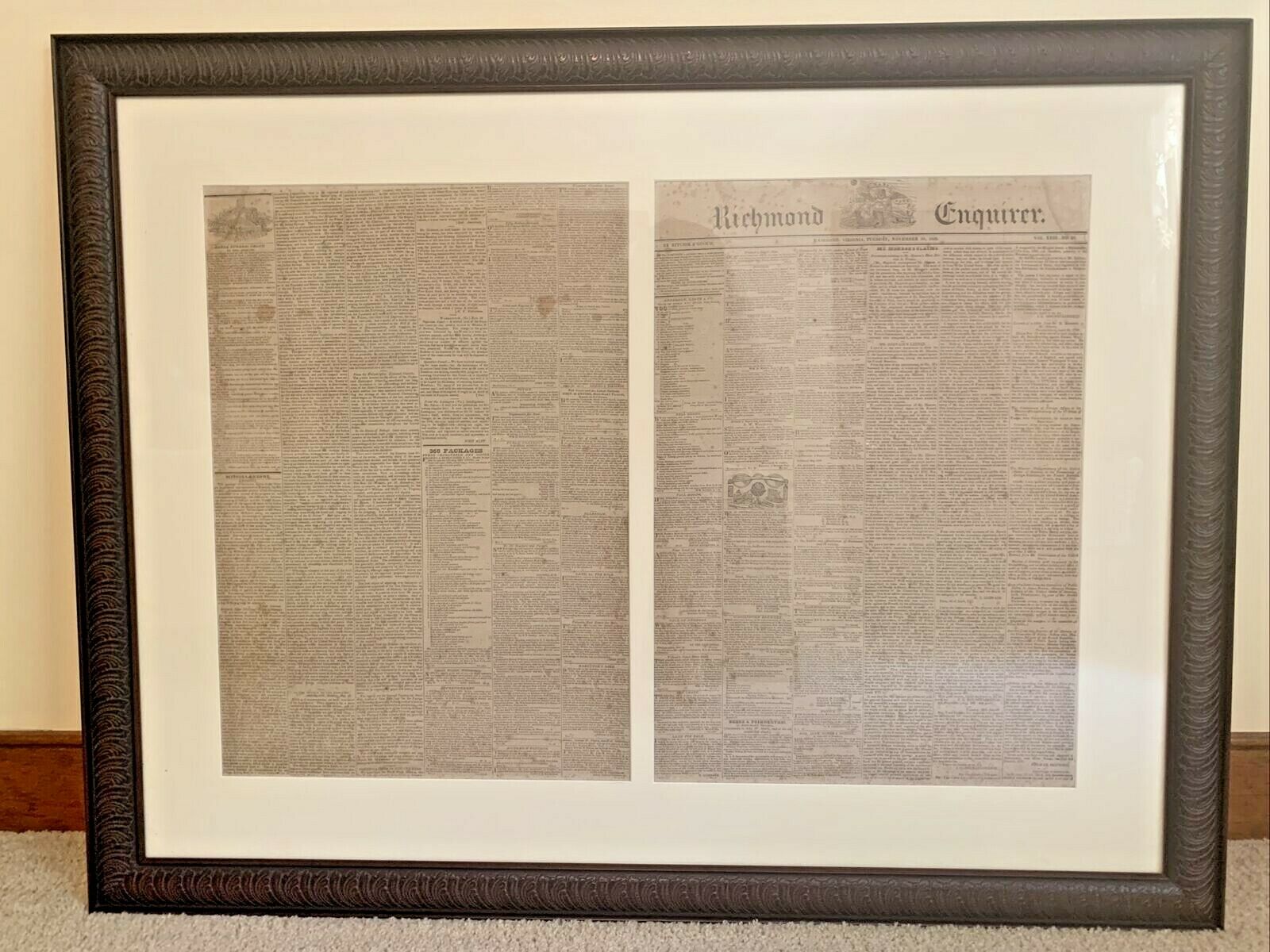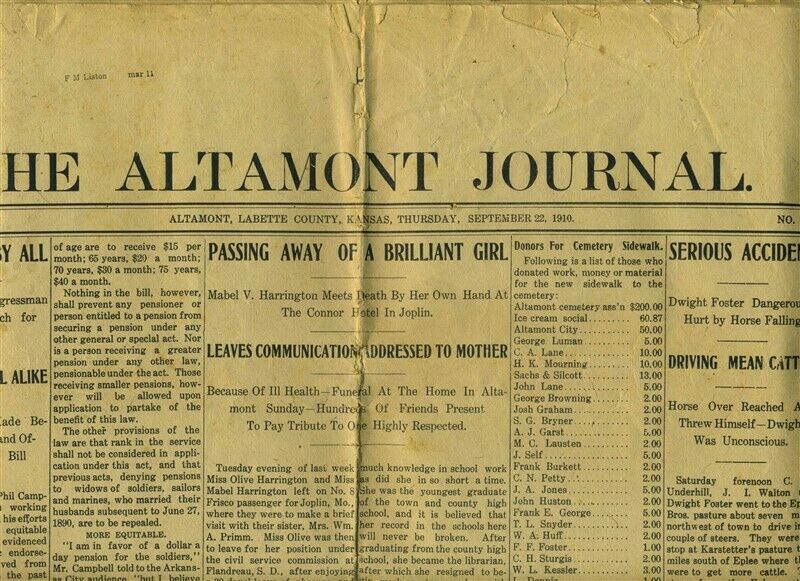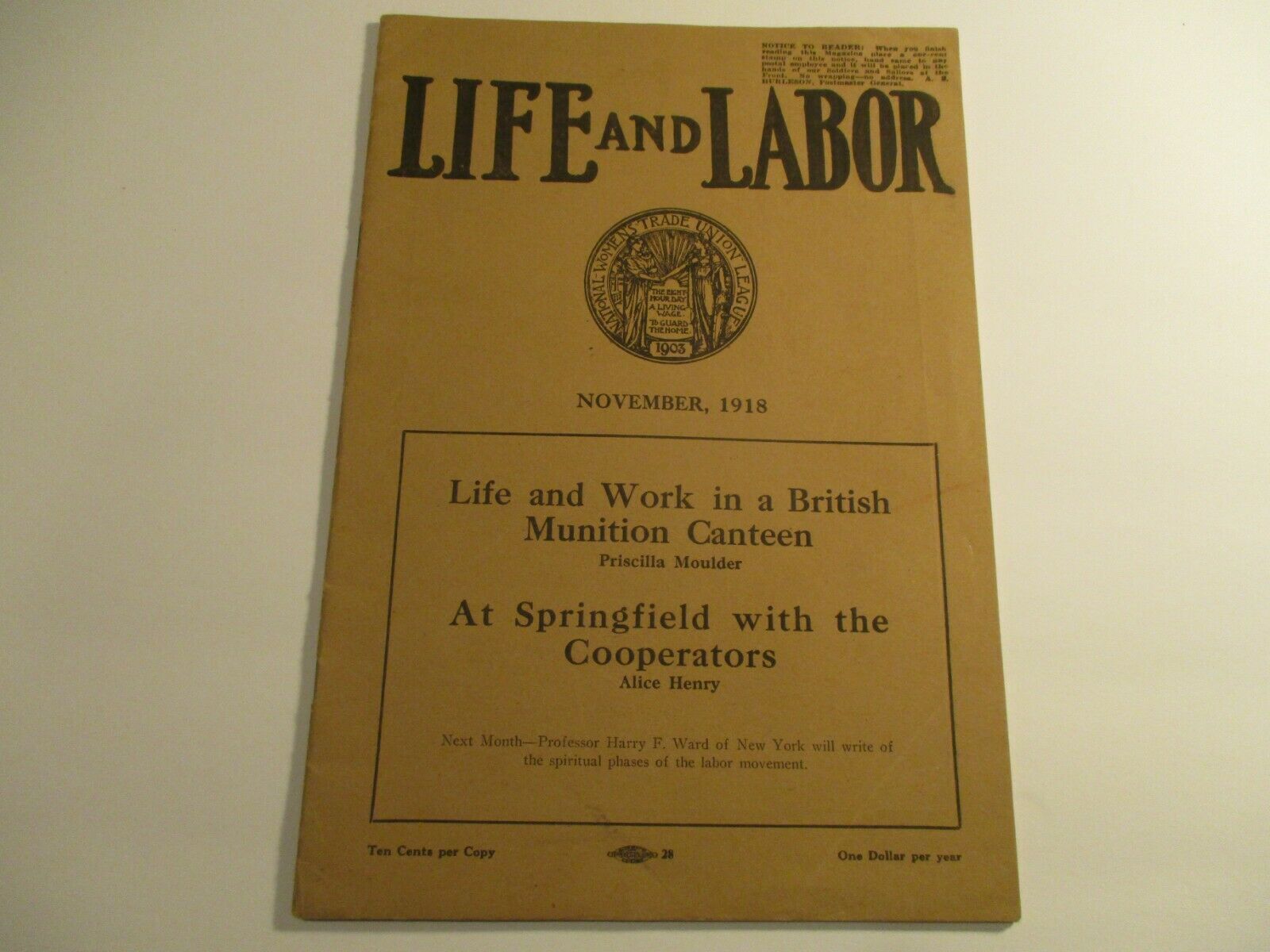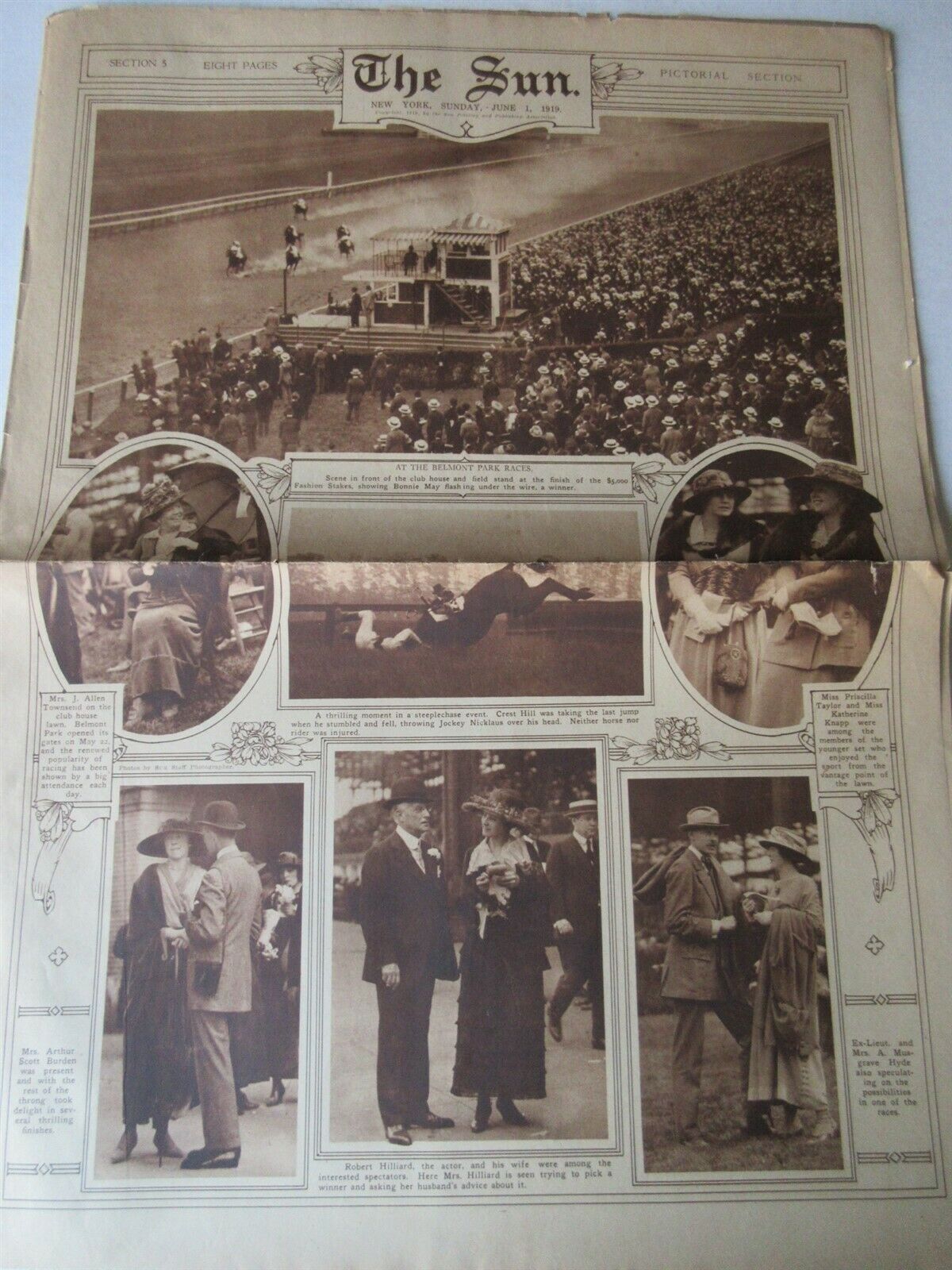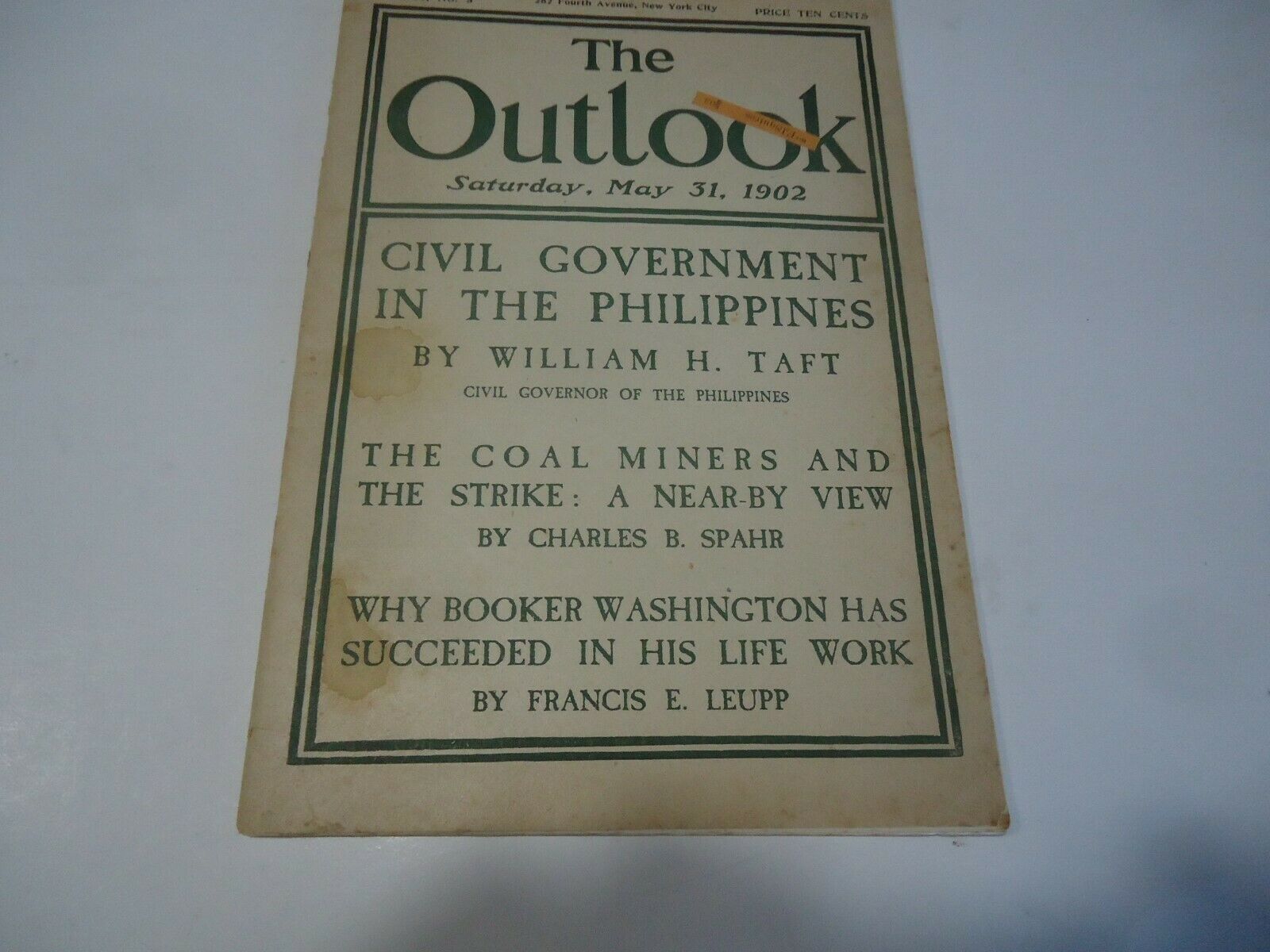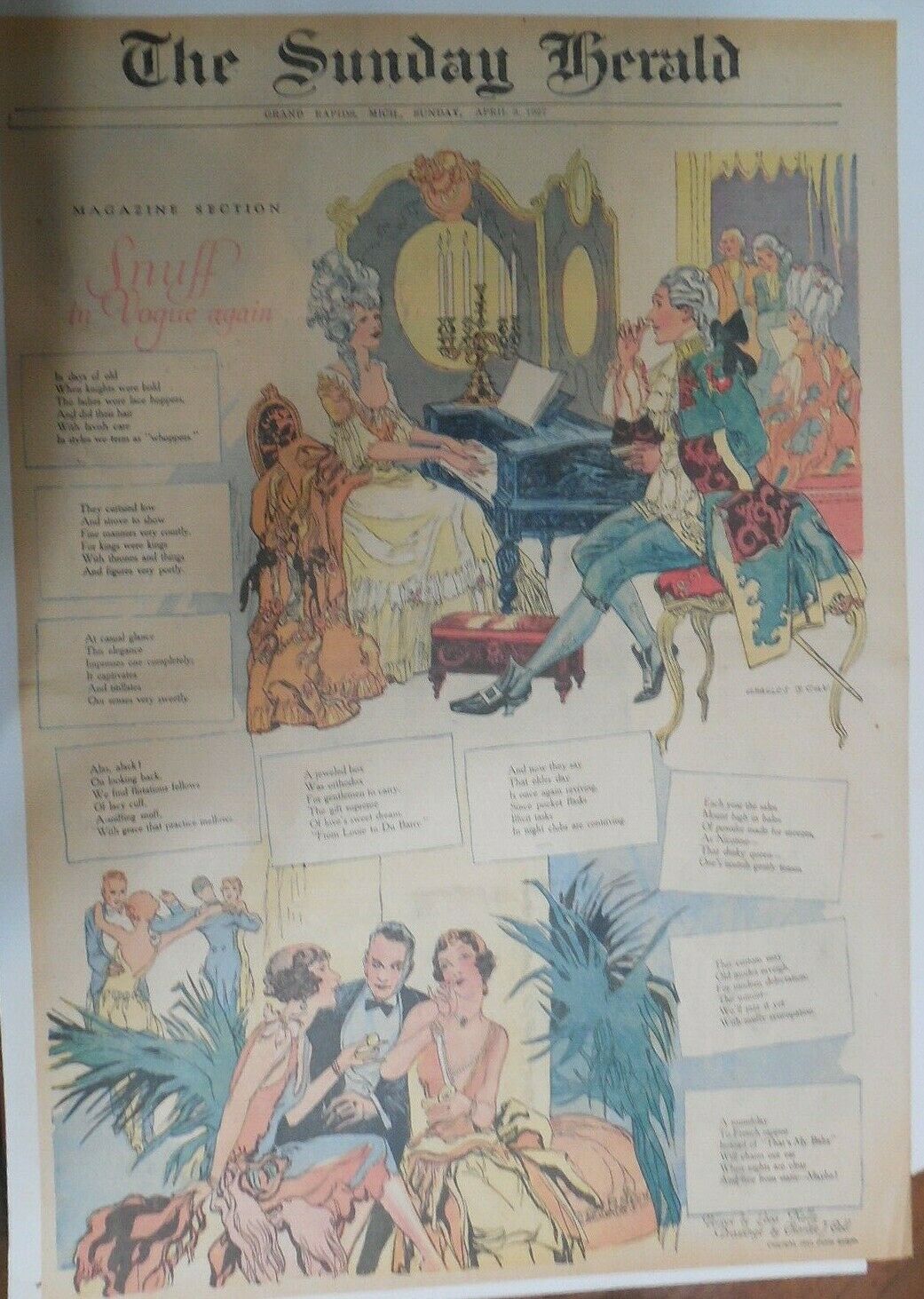-40%
Munich Beer Hall Putsch Hitler Arrested Revolt Crushed November 9 1923 WB37
$ 115.63
- Description
- Size Guide
Description
Original Boston Evening Transcript9th November 1923 (20 Pages)
This is an extremely rare find, early reports on the attack on Berlin involving four Germans involved in the
"Beer Garden Revolution"
Munich - Eric Von Ludendorff, Adolf Hitler, Ernst Poehner and Colonel Kriebel
Hitler was later sentenced to 5 years imprisonment .
This is an original newspaper, it is in good condition for being over 90 years old
The Beer Hall Putsch of 1923
The Beer Hall Putsch of November 1923, or the Munich Putsch, was Hitler’s attempt to overthrow the Weimar government of Ebert and establish a right wing nationalistic one in its place.
In September 1923, the Chancellor Gustav Stresemann and President Ebert had decided that the only way Germany could proceed after hyperinflation was to agree to work with the French as opposed to against them. Both called for passive resistance to be called off in the Ruhr Valley. In this sense, Stresemann agreed that the only way forward was for Germany to pay reparations as demanded by the Treaty of Versailles
.
To the nationalists in Germany, this was an admittance of guilt for starting the First World War. This admittance of guilt brought with it the punishment of reparations. Therefore, the logic of the nationalists was that Ebert and Stresemann were agreeing that Germany was guilty of starting the war – something they could not tolerate.
By 1923, many right wing parties had gravitated to southern Germany and primarily Bavaria. Here there were geographically as far away from Berlin without totally isolating themselves from the German people. Their headquarters was essentially Munich.
One such group was the fledgling Nazi Party. Lead by Adolf Hitler it had about 35,000 members by 1923. Though this figure appears low in the whole scheme of German politics (in the 1920 election the Nazis had not got one seat in the Reichstag), there were only about 40 members of the Nazi Party in 1920, so its growth rate was relatively quick. However, nationally, the Nazis Party was just one of a number of loud right-wing parties.
On November 8th and 9th1923, Hitler used the anger felt against the Berlin government in Bavaria to attempt an overthrow of the regional government in Munich in prelude to the take-over of the national government. This incident is generally known as the Beer Hall Putsch.
The fact that Hitler had only an estimated 35,000 followers to take over Germany’s second city showed his political naivety in 1923. Hitler placed all his hopes on people in Munich following his lead having been angered by the central government’s response to the Ruhr crisis. Such support never materialised.
On November 8th 1923, the Bavarian Prime Minister, Gustav Kahr, was addressing a meeting of around 3000 businessmen at a beer hall in Munich. Kahr was joined by some of the most senior men in Bavarian politics including Seisser, Bavaria’s police chief, and Lossow, the local army commander.
Gustav Kahr
Hitler and 600 of his Stormtroopers (the SA) went into the meeting from the back of the hall. These SA men, lead by Ernst Rohm, lined the sides of the hall in an attempt to intimidate those in the beer hall. It is said that Hitler, once on the speaker’s platform, shouted out the following:
“The national revolution has broken out. The hall is surrounded.”
SA men outside of the Beer Hall
Kahr, Lossow and Seisser were taken into a side room. Here, threatened by guns, Kahr is said to have agreed to support Hitler in his attempt to take-over the government in Berlin. Hitler promised Kahr that he would get a key position in the new national government and Lossow was promised a senior post in the German Army.
However, the historian William Shirer claims that Kahr refused to listen to Hitler and refused to be intimidated. Hitler was so unnerved by his silence that, according to Shirer, he rushed back to the stage about ten minutes later. Karl von Muller, who was at the meeting and was a witness at Hitler’s trial, also states that the group was absent from the stage for about ten minutes. Hitler declared to the waiting audience that Kahr had agreed to support him even though he had not.
When Hitler did return to the main hall, it was in such disarray that he fired a shot from his pistol into the ceiling and threatened to put a machine gun in a gallery if the people in the hall did not settle so that they could hear him.
Once the people in the hall had settled Hitler addressed them. Muller said the following at Hitler’s trial:
“(When he spoke) it was a rhetorical masterpiece. In fact, in a few sentences he totally transformed the mood of the audience. I have rarely experienced anything like it.”
Kahr and then the national war hero Luderndorff addressed those in the hall after Hitler had spoken. Both stated their support for Hitler and his attempt to overthrow the government. Muller stated that Hitler was “radiant with joy”.
However, Shirer puts a different slant on this episode. He claims that Luderndorff was furious that Hitler had attempted to do what he did without his prior support.
Luderndorff had retired to Bavaria after the war and had been taken in by the early rhetoric of Hitler. But he did expect that his national status entitled him to be more involved with decisions made within the party. In this case, Hitler had not consulted the general about the putsch.
Shirer claims that Luderndorff was pale and ashen faced when he spoke to the audience about the “great national cause” and that this was because he was so angered by what Hitler had done. Luderndorff’s demeanour and facial appearance is also supported by Muller who said the same at Hitler’s trial.
Once it became clear that Luderndorff supported Hitler, it seems that Kahr then agreed to publicly declare his support for Hitler. Once this happened the meeting started to break-up and the SA allowed people to leave.
We may never know what exactly took place that evening but the end result is that Hitler gained the support he had wanted from Bavaria’s senior politicians.
Once the beer hall meeting was over, Hitler started to plan his take-over of Munich. But Hitler had made one major error. He had let Kahr and his colleagues go. They reported what had happened to Berlin and the central government ordered that the army and police should put down the Nazis once they started their march. After his experience in the beer hall, Kahr was in no mood to disagree.
On November 9th, Hitler started his march with his followers. By the morning he knew that the army and police had been alerted that the Nazis would try to take over vital buildings in Munich. However, rather than call off the venture and lose any form of credibility, Hitler placed in faith in two things:
He would appeal to the army and police to support him and the Nazis in their national crusade against a dishonourable government.
With Luderndorff leading the march, he was confident that no one would fire on them, as they were lead by such a famous war hero.
Hitler started the march to the centre of Munich with 3000 men. At the centre of the city they were faced by 100 armed police and soldiers who blocked them from going down a narrow street called the Residenzstrasse. What happened next is not clear but shots were fired. The firing continued for just one minute but in that time sixteen Nazis and three policemen were killed.
Hitler had a dislocated shoulder. Some say this is was caused by his attempts to seek cover once the firing started. Hitler, (and the official biography of Hitler published after 1933) claimed that it was because he had caught a colleague as he fell who had been mortally wounded and the stress on his shoulder had dislocated it.
Hitler is said to have been driven away from the scene in a yellow car that was waiting for him. He was arrested two days later and was charged with treason. Luderndorff marched to a nearby square where he was arrested.
Why did Hitler do what he did? There was always the possibility that he would be killed or severely wounded as he knew that he would have been at the front of his followers. However, fours years on the Western Front may have dulled his fear of danger.
There is always the possibility that Hitler was forced into taking this action because members of the SA in Munich were becoming very restless. Their leader, Wilhelm Brucker, claimed that they wanted action.
“I said to Hitler personally: “The day is coming when I can no longer hold my people. If nothing happens now the men will melt away. We had very many unemployed men among us, men who had spent their last few pence on training, because, as they said, we will strike soon. Then we will be taken into the army and we will be out of the entire mess.”
Faced with the potential loss of men, was Hitler pushed into an action that he may not have wanted to get involved with? Was it rushed so much that Hitler did not have time to seek the advice and support of Luderndorff – hence the generals anger on November 8th? In later years, Hitler portrayed the Beer Hall Putsch as a great example of bravery but such was the control of information from 1933 to 1945, we may never know the full truth. What actually did happen did not come out in his trial.
What was Hitler’s assessment of the Beer Hall Putsch? In later years, he stated that it had been a success because it had not succeeded. In 1933, Hitler claimed that if they had succeeded in taking over Germany, they would have been faced with a national situation which the Nazis would not have been able to control. The Nazi Party was less than four years old and the depth of political experience was simply not there for the party to run the country.
However, Hitler did state that its outcome was to give the party its first martyrs and these deaths were used to great success when it came to Nazi propaganda.
Wonderful birthday gift with topical news from home and abroad including numerous photographs, stories, fashion and adverts.
We have a collection of these stunning newspapers, book reviews and magazines from the 1920's 1930's 1940's 1950's 1960's 1970's for January, February, March, April, May, June, July August, September, October, November and December. Covering most dates in any given month.
We also have an extensive archive of American and Canadian newspapers, magazines and book reviews covering most of the United States.
Some of the titles include: New York Times, Post, Sun, Herald, Tribune, Journal of Commerce, Kansas City Star, Times, Christian Science Monitor, San Francisco Chronicle, LA Times, Washington Times, Star, Baltimore, WSJ and many more titles.
Canada titles include - Montreal Daily Star, Gazette, Standard, La Patrie, Toronto Mail & Empire, Daily Star
Please don't hesitate to contact us through eBay messaging with any specific dates or inquiries, we would be delighted to search for you.
PROFESSIONAL, HIGH QUALITY PACKING, AS WE STRIVE TO DELIVER YOUR ITEM IN THE BEST POSSIBLE CONDITION.
